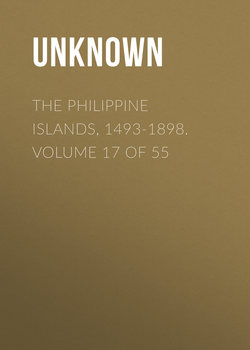Читать книгу The Philippine Islands, 1493-1898. Volume 17 of 55 - Unknown - Страница 55
На сайте Литреса книга снята с продажи.
Documents of 1609
Decree Regulating Services of Filipinos
ОглавлениеWe order that, in the Filipinas Islands, no Indians be distributed in repartimiento, in any number, for private or public means of gain; since for the cutting of wood, navigation of caracoas, and other works of this sort, in which our royal treasury is interested, and for the public convenience, the Chinese and Japanese found on any desired occasion in the city of Manila must be (as they are) hired; and, as is understood, there will be a sufficient number of workmen among them, who will engage in these services for the just price of their toil. From them shall be employed those who wish to hire themselves out, in order to avoid the concourse of Indians [at Manila]. In case that the repartimiento cannot be entirely avoided, as will be provided, and if the Chinese and Japanese are either unwilling or unable to satisfy the actual need of those public works, the governor and captain-general shall take measures with the Indians so that they may aid in the works freely and voluntarily, making use of the means that seem advisable to him to effect it. But, granted that there be a lack of voluntary workers, we permit that some Indians be forced to work in these occupations, under the following conditions, but in no other manner.
That this repartimiento shall be made only for necessary and unavoidable affairs; for in so odious a matter, the greater benefit to our royal treasury, or the greater convenience of the community, cannot suffice; and all that which is not necessary for their preservation, weighs less than the liberty of the Indians.
That the Indians in the repartimiento shall be lessened in number as the voluntary workers shall be introduced, whether the latter be Indians or those of other nations.
That they shall not be taken from distant districts, and from climates notably different from that of their own villages. The choice of all shall proceed without any partiality, and so that both the hardship of distances, the burden of the occupations, and compensation for the other circumstances in which there will be more or less grievance, shall be shared and distributed equally, so that all may share the greater and less toilsome services, so that the benefit and alleviation shown to some may not be changed into injury toward others.
That the governor assign the number of hours that they shall work each day, taking into consideration the lack of strength and weak physical constitutions.
That they be given in full the wages that they earn for their work. And they shall be paid personally each day, or at the end of the week, as they may choose.
That the repartimientos be made at a time that does not embarrass or hinder the sowing and harvesting of land products, or the other occasions and periods upon which the Indians have to attend to the profit and management of their property; for our intention is that they be not deprived of it, and that they may be able to attend to everything. Therefore, we order the governor that, at the beginning of the year, he shall take note of the building and other matters of our service in which the Indians have to be employed; for if the time is chosen, it may be arranged in such a way that the Indians may receive no considerable injury to their property or persons.
That, granting the poor arrangement and plan of the caracoas, and that when remanded to them many Indians generally perish, because of sailing without a deck, and exposed to the inclemencies of storms, we order that these craft be improved and built in such a manner that the Indians may manage the oars without risk of health and life.
In all the above, and in all that may touch their preservation and increase, we order the governor to proceed with the care and vigilance that we expect, and that he punish signally and rigorously the ill-treatment received by the Indians from their caciques or from the Spaniards—especially should the latter be our officials, upon whom the penalties must be more rigorously executed. We request and charge both the secular prelates and the provincials of the orders to exercise the same attention in the punishment of offenses of this nature, committed by the ministers of instruction and other ecclesiastical persons. And we order that any omission of the governors, justices, and officials entrusted, in whole or in part, with the observance and fulfilment of this law be made a matter of their residencia.
[Law passed in the reign of Felipe III, and dated Aranjuez, May 26, 1609.]
